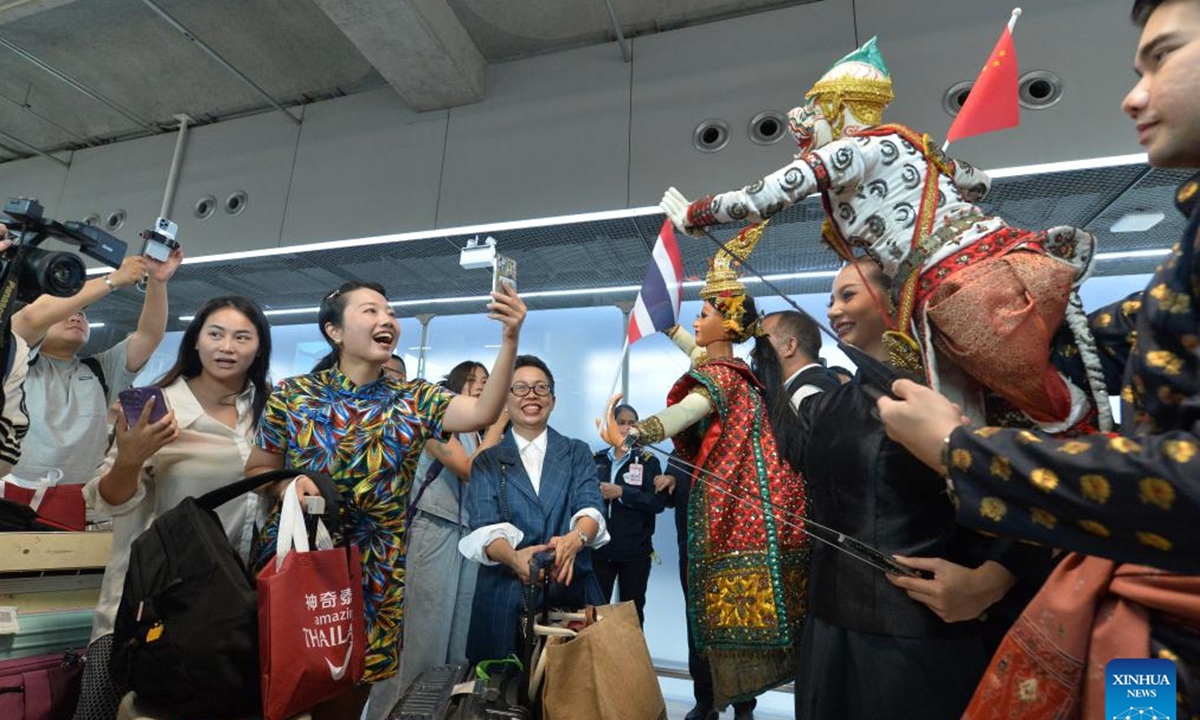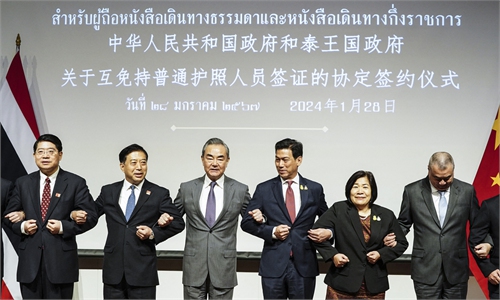China, Thailand sign mutual visa exemption agreement; to come into effect on March 1
Move to enhance tourism, trade and other exchanges

Staff members welcome Chinese tourists at Suvarnabhumi airport in Bangkok, Thailand, Sept. 25, 2023. Thailand extended a warm welcome to the first batch of visa-exempt flights from China on Monday, marking the launch of the nation's fresh initiative to reinvigorate its Chinese tourist market. (Photo: Xinhua)
China and Thailand signed on Sunday in Bangkok, Thailand a mutual visa exemption agreement , which will come into effect on March 1, 2024. The signing, which coincides with the ongoing wave of visa exemption agreements between China and other Southeast Asian countries, demonstrates China's commitment to expanding its openness. Experts believe the move aims not only to enhance tourism but also foster trade and facilitate exchanges.
During a media briefing after attending the signing ceremony in Bangkok with his Thai counterpart Parnpree Bahiddha-Nukara, Chinese Foreign Minister Wang Yi said that the agreement would not only benefit tourism in Thailand and Chinese tourists but also enhance mutual understanding between the two peoples.
Wang said that as both countries have entered the "visa-free era," it is believed that it will usher in a new peak in people-to-people exchanges between the two countries.
The number of Chinese tourists visiting Thailand will definitely increase significantly, said Wang, and that Thai friends are warmly welcomed to visit China and experience the vitality of China and the warmth and friendliness of the Chinese people.
Wang praised the vast potential of China-Thailand cooperation, vowed to import more agricultural products from Thailand and support more Chinese companies to invest in Thailand, especially in electronic vehicles, digital economy and green development cooperation. The Chinese foreign minister also vowed to enhance law enforcement cooperation to crackdown telecom fraud and other cross-border crimes.
Chinese nationals holding passports for public affairs or ordinary passports, and Thai nationals holding ordinary passports are allowed to enter each other's countries without a visa for a single stay of up to 30 days, according to the agreement.
Shortly after the news was released at noon on Sunday, data from Ctrip, one of China's largest online travel agencies, showed that the search popularity of keywords related to Thailand increased more than seven times compared to the previous day. Among them, the growth in searches for flight tickets and hotels increased sixfold.
As of press time, the number of bookings from Chinese tourists traveling to Thailand for the 2024 Spring Festival has increased by more than 13 times compared to the previous year, according to Ctrip.
Among those travelers, 44 percent are families with children, nearly half are aged around 45 years old, and 33 percent are people in their 30s. The company pointed to new trends of small group and in-depth travel, with money spent on experiences and eating.
The hashtag "mutual visa exemption between China and Thailand" has been read more than 95 million times on China's X-like platform Sina Weibo as of press time.
Thai Prime Minister Srettha Thavisin said previously that by promoting the implementation of the visa-free policy, Thailand will see its domestic tourism market flourish again following the return of Chinese tourists, local media reported.
Thailand had previously granted temporary visa waiver status for visitors from China, which had been scheduled to end on February 29, 2024.
The tourism resources of China and Thailand complement each other, and China is also the closest snow and ice tourism destination to Thailand, said Qin Jing, general manager of Public Affairs at Ctrip Group. The permanent visa exemption will also further encourage Thai tourists to travel to China, and it is expected to push Thailand to become one of the top three source countries for inbound tourism to China in 2024, according to Qin.
On Thursday, China and Singapore also signed an agreement on mutual visa exemption, which will officially come into effect on February 9, 2024. Malaysia has also exempted Chinese citizens from visa requirements.
Mutual visa exemption policies between China and those Southeast Asian countries since the beginning of this year is another demonstration of China's efforts and determination to open up, Gu Xiaosong, dean of the ASEAN Research Institute of Hainan Tropical Ocean University, told the Global Times on Sunday. He noted that Southeast Asia, which is geographically adjacent and enjoys warm ties with China, is China's priority choice for further opening-up.
Gu stated that in addition to bolstering tourism, the visa exemption will foster increased trade and cultural exchanges between China and the countries involved. He emphasized the significant investments made by both China and these countries, highlighting the potential for enhanced trade and investment opportunities. The facilitation of unrestricted travel is expected to serve as a catalyst for further economic cooperation and collaboration between China and Southeast Asian countries.
During the January-November period in 2023, China's trade with its largest trade partner, the Association of Southeast Asian Nations (ASEAN), rose 0.1 percent year-on-year to 5.8 trillion yuan ($817 billion), accounting for 15.3 percent of China's total trade value, according to the Xinhua News Agency.


